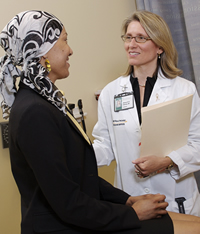
Dr. Sheryl Gabram-Mendola and cancer patient
Georgia women at higher risk for breast and ovarian cancer will soon have new tools and support to perhaps help them dodge the cancer bullet.
Thanks to a grant recently awarded to Winship Cancer Institute of Emory University, the Georgia Department of Public Health, the Georgia Center for Oncology Research and Education (Georgia CORE) and the Morehouse School of Medicine, researchers and clinicians will be better able to identify women who need comprehensive risk assessment, genetic counseling and possible clinical interventions. The $900,000, three-year grant comes from the federal Centers for Disease Control and Prevention and was awarded to only three states.
“Thousands of women will benefit from this,” says Dr. Sheryl Gabram-Mendola, director of the High Risk Assessment Program, Winship Cancer Institute of Emory University and the Avon Comprehensive Breast Center at Grady. “This is an incredible opportunity that brings together private and public funding to reach out to all women, including those who are underserved.”
The program aims to deliver genetic counseling to high-risk women so they can have more evidence-based, scientific information about their breast and ovarian cancer risk and less guesswork and anxiety about how to manage their risk.
A blood test currently exists for women to learn whether they may carry a mutation in specific genes, called BRCA1 and BRCA2, implicated in breast and ovarian cancers. The test costs about $3,000. About 5 to 10 percent of women with breast cancer carry the mutation; about 10 to 15 percent of women with ovarian cancer carry the mutation. Some women, however, may not need the blood test at all, and others who are identified as high risk would benefit from information, in addition to the blood test results, about how to get help, Gabram-Mendola says.
“It is not appropriate to indiscriminately have the blood test without first discussing the indications and implications of the test with trained professional genetic counselors,” Gabram-Mendola says. The genetic counselors would partner with physicians in the high-risk clinic to develop an individualized “high-risk” plan for each woman based on the results.
The first step in identifying the at-risk women will be an online screening assessment tool for patients and clinicians, developed by Cecelia Bellcross, PhD, Emory genetics counselor and director of the new Emory Genetic Counseling Training Program. The test, called the Breast Cancer Genetics Screening Tool (B-RST), is not meant to determine whether a woman should be tested for the BRCA genetic mutation. Rather, it is to determine whether a woman may need genetic counseling and then testing for the BRCA mutation if indicated.
Based on this information, high risk women may benefit from instituting lifestyle interventions or other treatments, including referral for MRI imaging in addition to mammography, weight loss programs, or taking tamoxifen or other drugs that lower breast cancer risk. In addition, women who are found to be BRCA carriers may be offered surgery to remove their ovaries to reduce their risk of ovarian cancer.
Women can go online and answer the questions, which takes only a few minutes, when they arrive for their annual mammogram, Gabram-Mendola explains. Winship is in the process of implementing such a program and tracking the results so women can be given appropriate follow-up.
Gabram-Mendola notes that Georgia has several population pockets in which breast cancer rates are higher than average. It is essential to know why women in these pockets tend to be at higher risk and also to identify them before they are diagnosed, Gabram-Mendola says.
The grant is a key to doing just that. Gabram-Mendola notes that it was particularly meaningful that Georgia received the award because the only other two states awarded such a grant– Oregon and Michigan – already have programs in place and that Georgia’s proposal thus had to be particularly convincing. It was so, Gabram-Mendola noted, because of an unusually high number of letters of support, as well as the fact that the screening test was developed right on Emory’s campus. She also praised the generosity of the Wilbur and Hilda Glenn Family Foundation, which has given generously to establish the Glenn Family Breast Program. That program provided funding for the recent expansion of the High Risk Assessment Program at Winship.
Breast cancer is the most commonly occurring cancer among women, afflicting about 210,000 women a year.
